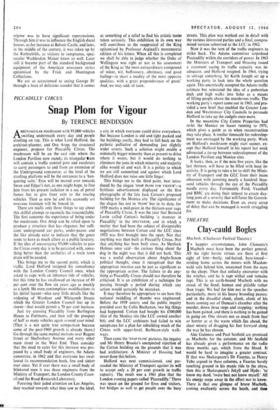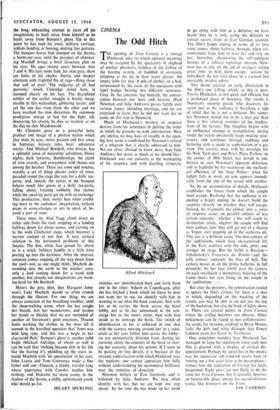THEATRE
Clay-cauld Bogies
Macbeth. (Chichester Festival Theatre.)
TN happier circumstances, John Clements's 'Macbeth must have been the perfect general. All the right heroic virtues are there at first sight of him—burly, red-haired, bare-kneed- striding home across the moors with Macdon- wald safe behind him, unseamed from the nave to the chops. Then that unlucky encounter with the witches, and he is rapt withal and remains rapt. This is an earth-bound Macbeth with no streak of the fiend; human and pitiable rather than tragic. We feel for him not in the speeches particularly, more in his heavy brooding pauses; and in the dreadful clunk, clunk, clunk of his boots coming out of Duncan's chamber after the murder, down three steps and stopping: nothing has been gained, and there is nothing to be gained in going • on. One shivers not so much from fear ' or horror as at the Waste which lies ahead, the sheer 'misery of dragging his feet forward along the way he has chosen.
Alec Guinness and Paul Scofield are promised as Macbeths for the autumn; and Mr Scofield has already given a performance on the radio three months ago, which froze the blood. It would be hard to imagine a greater contrast' If that was Shakespeare's Dr Faustus, as Henry Tube argued in these columns, a Faustus barely touching ground in his manic ride to the abyss, then this is Shakespeare's Jekyll and Hyde: 'to know my deed, 'twere best not know myself.' All his energy seeps away in the effort not to know. There is that one glimpse of brave' Macbeth, coining exultantly acrois the heath, and then the long, exhausting attempt to stave off his imagination, to back away from himself as he backs away from Banquo's ghost. Up to this point he has kept his erect, military carriage, seldom bending or bowing, making few gestures. The banquet leaves him slumped on the throne, a burnt-out case, until the prospect of eliminat- ing Macduff brings a brief ferocious glint to his eyes. He ages twenty years between Acts 3 and 4. His hair turns lank, his skin grey, there are holes in his cheeks. Inertia and despair alternate with frightful fits of rage—Hang those that talk of fear! 'The vulgarity of all bad passions,' which Coleridge noted here, is stamped clearly on his face. The disciplined soldier of the earlier struggle is barely recog- nisable in this malevolent, gibbering tyrant; and yet the one has risen from the other and we have watched the slow distortion. He summons prodigious energy at last for the fight; till, despairing his charm, he dies as resolute as on the day he slew Macdonwald.
Mr Clements gives us a powerful hero, product and image of a puritan nation which also shuts its eyes, stores passion and fear away in fantasies, nursery tales, boys' adventure stories. And Michael Benthall, who directs, has a splendid sense of masculine adventure, blowy nights, dark lanterns, thunderclaps, the clank of iron swords, and everywhere wild thanes out among the heather. There are some odd touches, notably a set of dingy plaster joints of meat, paraded round the stage like eats for a dolls' tea- party; and, indeed, the extras at the banquet behave much like guests at a dolls' tea-party, falling about, freezing suddenly like statues while the speaking parts get on with an exchange. This production, then, works best when confid- ing most to the audiences' imagination, without props or scene-changes or sets to speak of, be- yond a pair of steps.
These steps, by Alan Tagg, climb down on either side from the roof, stopping at a landing halfway down for closet scenes, and curving on to the wide Chichester stage, which becomes a narrow cockpit at our feet. A neat vertical solution to the horizontal problems of this theatre. The dim, white face poised far above us is a witch. Soldiers huddle in a little knot peering up into the darkness. After the interval, someone comes stepping all the way down from the roof—not, as one might think, Macbeth de- scending into the earth to the witches' cave, only a lord coming down for a word with another, but already our imaginations are work- ing hard for Mr Benthall.
More's the pity, then, that Margaret John- ston's Lady Macbeth should •so often crunch through the illusion. For one thing, we are always conscious of her breathing troubles; until the sleep-walking scene, when she has caught her breath, lost her mannerisms, and washes her hands so bleakly that we are reminded of another of Stevenson's grim creatures, Thrawn Janet washing the clothes in the river till it seemed to the horrified spectator that 'Janet was deid lang sync, and this was a bogie in her clay-cauld flesh.' Banquo's ghost is another solid bogie (Michael Aldridge, of whom as well it can be said that 'nothing became him in his life like the leaving it'), plodding up the stairs to- wards Macbeth with `no speculation' in his eyes. John Laurie and Tom Courtenay make a fine father and son—Duncan, a kindly, trustful king whose experience with Cawdor teaches him nothing, and Malcolm far more canny in the shadow of the throne, a chilly, opinionated youth who should go far.
HILARY SPUR LING































 Previous page
Previous page